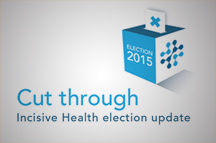 The Liberal Democrats face a tough job on health and their manifesto reflects the reality of the situation they face.
The Liberal Democrats face a tough job on health and their manifesto reflects the reality of the situation they face.
Activists are proud of achievements on mental health, social care reform and local involvement in decisions. However, the party's role in pushing through the Health and Social Care Act has made it difficult to translate its achievements into popular support.
Incisive Health polling shows that voters rarely give the party credit for its policies (for example on mental health waiting times or NHS spending). Public trust in Nick Clegg on the NHS lags behind trust in Nigel Farage.
The manifesto should therefore be seen less as a series of individual pledges than as a bid to be given the opportunity to act as a moderating force on whoever is the biggest party in the next Parliament (‘look left, look right, then cross’).
This is a message designed to appeal to wavering voters in the Conservative-Liberal Democrat marginals (‘vote for us and we’ll make sure the other lot are nicer on health’). Strategists will also hope that Labour’s failure to commit to the full £8 billion for the NHS will give potential switchers in Labour-Liberal Democrat marginals a reason to trust the party one more time.
Apart from the pre-announced commitments to the seemingly magical £8 billion in funding and promising to priorities mental health, the manifesto makes some very clear nods to the Five Year Forward View, pledging new models of care and greater integration.
The party has also committed to end the role of the Competition and Markets Authority in health, revisiting the tensions seen during the passage of the 2012 Health and Social Care Act.
Outside of the health section there is a focus on consumer protection and exploring options for enabling ‘super complaints’ against public services and promising an overhaul of the ombudsman system.
If the Liberal Democrats central offer is to be kinder than the Conservatives and tougher than Labour (or is that that the other way round, given the events of the past couple of days?) then health is an important part of this strategy. Nick Clegg will hope that voters are listening more to the overall message than they are to the individual policies.













